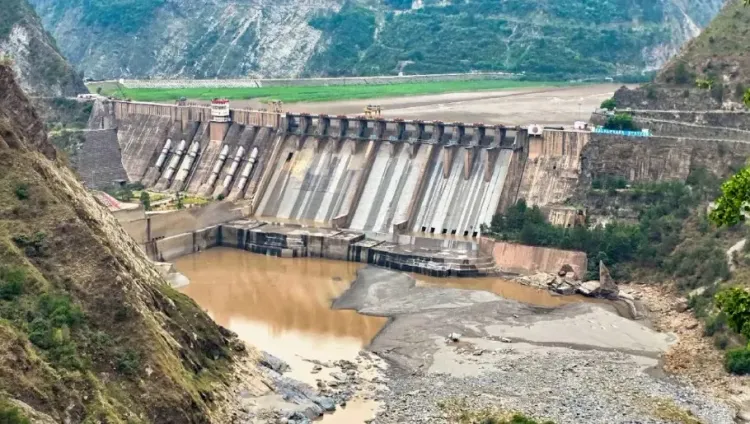Will Pakistan Urge India to Reassess the Suspension of the Indus Waters Treaty?

Synopsis
Key Takeaways
- Indus Waters Treaty has been a vital agreement for over 60 years.
- India suspended the treaty citing national security concerns.
- The treaty allocates water from the Indus River system between India and Pakistan.
- Pakistan has warned that the suspension could lead to a crisis.
- India is implementing strategies to manage water resources effectively.
New Delhi, May 15 (NationPress) Just days after the understanding with Pakistan following the significant impact of the Indian Armed Forces on the Pakistani defense and military, Islamabad has reportedly sent a letter to New Delhi, requesting a reconsideration of the decision to place the Indus Waters Treaty in abeyance.
The Ministry of Water Resources in Pakistan has alleged that it reached out to New Delhi to restore the flow of rivers into Pakistan under the framework of the Indus Waters Treaty, as reported by various media outlets.
This treaty is a crucial water-sharing agreement that has persisted for over sixty years.
The request arrives after India suspended the 1960 treaty in response to a recent terrorist attack supported by Pakistan in Jammu and Kashmir's Pahalgam on April 22, which tragically resulted in the deaths of 26 civilians, primarily tourists.
India, citing its national security concerns, has paused the treaty until Islamabad “credibly and irrevocably” ceases its support for terrorism.
This decision was supported by the Cabinet Committee on Security (CCS), the top body overseeing strategic matters, marking a historic first for New Delhi in suspending the World Bank-brokered treaty.
In a communication directed to India's Ministry of External Affairs, the Pakistani Ministry cautioned that such a suspension could instigate a crisis in its nation.
Prime Minister Narendra Modi, in his initial remarks following Operation Sindoor, reiterated the government's firm stance, stating, “Water and blood cannot flow together.”
“Terror and dialogue cannot coexist. Terror and commerce cannot happen at the same time.”
Nonetheless, Indian officials have dismissed these apprehensions, highlighting Pakistan's enduring use of terrorism as an instrument of state policy.
The treaty designates three western rivers—Indus, Jhelum, and Chenab—to Pakistan, while the eastern rivers—Sutlej, Beas, and Ravi—remain with India.
India has now articulated a three-tier strategy—short-term, mid-term, and long-term—to prevent any flow of Indus waters into Pakistan.
Union Jal Shakti Minister C.R. Paatil emphasized that measures are being implemented to ensure that not a single drop of water leaves Indian territory without being utilized.
India's Foreign Ministry Spokesperson Randhir Jaiswal reinforced the government’s position, stating, “The Indus Waters Treaty was based on goodwill and friendship. Pakistan has undermined these values by endorsing cross-border terrorism for decades.”
The firm response follows Operation Sindoor, a swift military action initiated after the Pahalgam attack, which led to a brief ceasefire agreement. However, New Delhi has made it clear: future discussions with Islamabad will be strictly focused on one agenda—eliminating terrorism and securing the return of Pakistan-Occupied Kashmir.
Under the 1960 treaty, India receives approximately 30 percent of the total water from the Indus River System located within its territory, while Pakistan is allocated the remaining 70 percent.
With the Indus Waters Treaty now suspended, the Narendra Modi government is anticipated to undertake significant actions to advance stalled hydroelectric projects.
A crucial meeting is expected to take place this week involving Home Minister Amit Shah, Water Resources Minister Paatil, Power Minister Manohar Lal Khattar, Agriculture Minister Shivraj Singh Chouhan, and senior officials from all relevant Ministries. Since the suspension of the treaty, two meetings have already been convened between Amit Shah, Paatil, and top officials from the Ministry.









